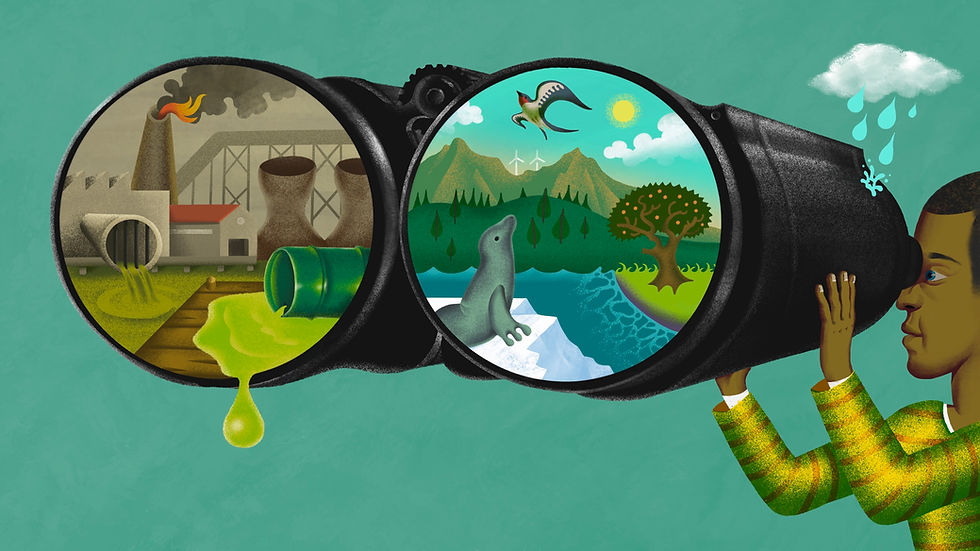The Growing Impact of Climate Change on Mental Health
- Heartscape Psychology
- Sep 6, 2024
- 2 min read
By Philmon Lim, Heartscape Psychology Intern
Climate change is no longer just an environmental issue—it has become a significant concern for mental health as well (Clayton et al., 2017; Hayes et al., 2018). As extreme weather events, rising temperatures, and environmental degradation become more frequent, their psychological impacts are increasingly being recognized by mental health professionals (Berry et al., 2018; Doherty & Clayton, 2011). One of the most prevalent mental health issues related to climate change is eco-anxiety. This term describes the chronic fear of environmental doom and the distress caused by awareness of climate change (Clayton et al., 2017). People, particularly younger generations, are experiencing heightened levels of anxiety, helplessness, and grief as they confront the reality of a warming planet. This anxiety is not irrational; it stems from a deep concern for the future and the perceived lack of action from governments and industries.

Another significant impact of climate change is the rise in climate-related trauma. Natural disasters such as hurricanes, wildfires, and floods are becoming more frequent and severe due to climate change, leading to an increase in post-traumatic stress disorder (PTSD), depression, and anxiety among survivors (Doherty & Clayton, 2011). These events can destroy homes, communities, and livelihoods, leaving lasting psychological scars.

Moreover, climate change disproportionately affects vulnerable populations, including those in low-income regions, indigenous communities, and people with pre-existing mental health conditions. These groups often have fewer resources to cope with the impacts of climate change, leading to exacerbated mental health issues (Hayes et al., 2018). In response to these challenges, mental health services are beginning to integrate climate awareness into their practices. Therapists are now more attuned to the impacts of climate change on their clients and are incorporating strategies to address eco-anxiety and climate-related trauma (Clayton et al., 2017; Cunsolo & Ellis, 2018). Community resilience programs are also being developed to help people cope with the psychological effects of natural disasters and long-term climate change (Berry et al., 2018).
In conclusion, climate change is not just an environmental crisis but a growing mental health crisis as well. Addressing the psychological impacts of climate change is essential for building resilient communities and supporting those most affected by this global challenge.
References
Berry, H. L., Waite, T. D., Dear, K. B., Capon, A. G., & Murray, V. (2018). The case for systems thinking about climate change and mental health. Nature Climate Change, 8(4), 282-290. https://doi.org/10.1038/s41558-018-0102-4
Clayton, S., Manning, C. M., Krygsman, K., & Speiser, M. (2017). Mental health and our changing climate: Impacts, implications, and guidance. American Psychological Association, and ecoAmerica. https://www.apa.org/news/press/releases/2017/03/mental-health-climate.pdf
Doherty, T. J., & Clayton, S. (2011). The psychological impacts of global climate change. American Psychologist, 66(4), 265-276. https://doi.org/10.1037/a0023141
Hayes, K., Blashki, G., Wiseman, J., Burke, S., & Reifels, L. (2018). Climate change and mental health: Risks, impacts and priority actions. International Journal of Mental Health Systems, 12(1), 28. https://doi.org/10.1186/s13033-018-0210-6
Hickman, C., Marks, E., Pihkala, P., Clayton, S., Lewandowski, R. E., Mayall, E. E., Wray, B., Mellor, C., & van Susteren, L. (2021). Climate anxiety in children and young people and their beliefs about government responses to climate change: A global survey. The Lancet Planetary Health, 5(12), e863-e873. https://doi.org/10.1016/S2542-5196(21)00278-3




Comments